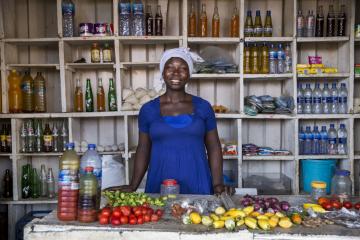
Creating a policy lab for evaluating social inclusion policy in Spain

This blog was updated on May 16, 2023 to reflect the current status of J-PAL's partnership with the Spanish government.
Together with a team of Spanish and international researchers coordinated by the Centro de Estudios Monetarios y Financieros, J-PAL Europe is partnering with the Spanish Ministry of Inclusion, Social Security, and Migration to launch a Policy Lab focused on bringing evidence to the core of social policymaking in Spain.
Spain has targeted part of its €69.5 billion Covid-19 NextGenerationEU Recovery plan toward strengthening economic and social resilience. This includes a broad range of pilot social inclusion programmes for the country’s most vulnerable households—ranging from job search support to online tutoring to childcare to targeting beneficiaries of a national minimum income scheme rolled out in 2020.
To better understand the effectiveness of these policies, the government has committed to piloting and evaluating each of these programmes through a series of randomised evaluations run through the new Policy Lab, which will provide insights for social policy in Spain at both the national and regional level.
The emergence of a national minimum income scheme in Spain
At the heart of the Lab is an interest in generating lessons on how to complement or extend the effects of a new national minimum income scheme designed to promote social inclusion and employment for the country’s most vulnerable households. Prior to the pandemic, Spain was one of the only EU countries without a national minimum income scheme. Instead, it relied on regional government income schemes that varied in terms of size and scope but reached an average of only 8 percent of people living below the poverty line.
The impact of the economic shock linked to Covid-19 underscored the need for such a program: unemployment levels rose to 15.3 percent during the second quarter of 2020, and by the end of 2020, poverty had increased to its highest level since 2008. This ranked Spain as the country with the fifth highest poverty rates in the European Union (EU).
Launched in May 2020, the national minimum income (ingreso mínimo vital, or IMV) provides a cash transfer for individuals and households based on their income and size—roughly €500 for a single individual (in 2022) or €787 for a two-parent household with one child. Designed by the Ministry of Inclusion, Social Security, and Migration (MISSM), this transfer is meant to provide an equal foundation of support for vulnerable households across Spain.
Complementing a national income scheme with broader social protection programs
While minimum income schemes are an important tool in addressing poverty, they are not always sufficient in themselves to help households exit poverty or to promote broader social inclusion. Complementary interventions like those being tested in Spain can create a range of pathways (itinerarios) to social inclusion.
To date, MISSM has funded 34 educational, employment, and psychosocial interventions proposed by NGOs and regional or local governments across the country. They include providing IMV beneficiaries with job search support and apprenticeship training, tailored tutoring for their children, and assistance for families who do not yet claim the social benefits to which they are entitled.
A bold commitment towards rigorous impact evaluation
The boldness of this social policy endeavour comes from its commitment to employing rigorous impact evaluations to inform social policy decisions. In order to receive funding from the Ministry, all proposals commit to running a randomised evaluation. The results from these evaluations will allow the government and implementing partners to determine whether these complementary programmes are indeed effective (and why) prior to scaling up the most effective solutions.
This large-scale effort across all levels of government to generate and use evidence in the policy making process could set a valuable example for how social policy is designed in the future, not only in Spain but also more broadly in Europe. The European Commission has expressed interest in using the learnings from these evaluations as inputs in future funding decisions for social protection programmes in the region.
This extensive effort involves working across multiple implementing partners and many local contexts, the majority of whom do not have previous exposure to randomised evaluation methods. Ensuring these partners and programs are following best practices for conducting high-quality evaluations—and are understanding and applying the results to decision-making—necessitates hands-on support from researchers who are deeply embedded in the local context.
To support this work, the Ministry has partnered with J-PAL Europe and a group of around eighteen researchers from leading universities under the coordination of the Centro de Estudios Monetarios y Financieros (CEMFI) in Madrid. J-PAL Europe works together with the Ministry and CEMFI to generate rigorous insights from these randomised evaluations, not only to inform each partners’ own programming, but also to contribute to a growing evidence base on designing more effective social programs across Europe.
A unique opportunity to generate insights on evidence-based government partnerships
At J-PAL, our mission is to ensure policy is backed by scientific evidence. We have learned that efforts to promote the use of evidence in policymaking are generally most successful when they start with specific demand from policymakers for evidence on certain questions.
This collaboration with the Spanish government, recently formalised through a Memorandum of Understanding, presents a considerable investment in learning from evaluations from the outset, and offers an opportunity to build on our previous lessons from government partnerships, including by supporting the Ministry in obtaining buy-in for drawing on research findings across different levels of government and various types of implementing stakeholders; as well as working to create a culture of evidence use that will outlast the tenure of any single administration.
J-PAL Europe has embedded a staff member at the Ministry to provide technical assistance in the design of the evaluations, develop a system to transform the evidence generated into actionable and scalable policies, and to develop a learning agenda to inform future policymaking. Furthermore, by participating in the Steering Committee that oversees the project, J-PAL Europe contributes to the strategic vision of the Policy Lab and its long-term trajectory.
We look forward to sharing the results from the ongoing evaluations and lessons and to continue supporting the Spanish government in their ambitious efforts.




